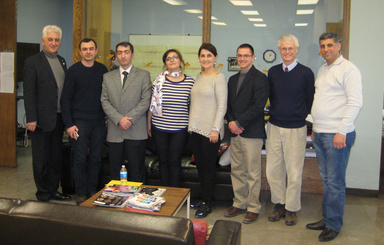
Urban and Regional Planning faculty and students recently met with a group of six academic and practicing planners from the country of Azerbaijan. The opportunity was sponsored by the U.S. Department of State for a two day visit to the University of Iowa for vocational and professional training. While here, their objectives were:
- To learn which aspects of urban planning and development are included in the U.S. curriculum, as well as which methods (lectures, practical experience, etc.) are utilized in delivering knowledge of these aspects to the students;
- To discuss job placement and other employment assistance programs available to students leading up to their graduation (and beyond)
- To gain insight into urban planning challenges of modern American cities, and how these challenges are being addressed; including,
- The balance of old and new development
- Traffic planning
- The use of mixed space for commercial and residential planning;
- Environmental issues, urban blight and gentrification challenges
- Green building design and smart technology
The planners met with five second-year graduate students working on a capstone project on the redevelopment of the Mississippi Riverfront in Muscatine, Iowa. Their project is part of the Iowa Initiative for Sustainable Communities (please see http://iisc.uiowa.edu/). The students presented information about their project, including high quality photos and maps to enable the visitors to understand and comment on the planning challenge.
A discussion of the project followed in which the visitors were asked to discuss how such a planning challenge might be addressed in their country. The planning challenge involves planning for a flood-prone riverfront park, which is separated from downtown Muscatine by a four lane state highway. The project therefore focuses on how to improve the amenity value of the park, support downtown revitalization, while coping with the challenges posed by the four lane highway, the flooding, and the park’s current use as a parking lot (25 percent of the park is occupied by hard surface parking). The visitors enjoyed discussing ideas for how they would address this challenge and certainly the students benefited as they go forward with their project.
After a relaxed lunch with the visitors, translators, students and faculty, a more in depth discussion of planning was undertaken. Nick Benson, Program Coordinator of the Iowa Initiative for Sustainable Communities, met with the group to give the visitors a more complete context for the project and for how the University of Iowa engages in assisting Iowa communities.